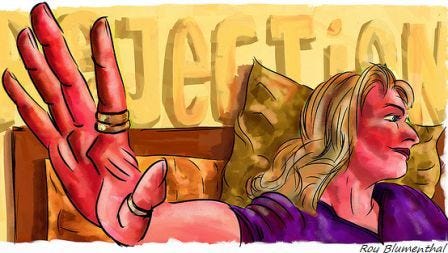Navigating the Pain of Rejection and Breakups: A Guide
Written on

Recovery from rejection can be particularly challenging due to our nervous system's inherent need for social connections. The pain of romantic rejection is notably intense, as feelings of loneliness and the desire for connection are deeply rooted in our evolutionary history for survival and reproduction. Ideally, these feelings of loneliness should motivate us to reach out and nurture our relationships.
Research from UCLA indicates that the brain processes emotional pain in a similar way to physical pain, suggesting they can be equally distressing. Our genetic makeup also influences our response to pain; those who are more sensitive to physical discomfort may find themselves more susceptible to feelings of rejection. Furthermore, anthropologist Helen Fisher notes that the intense pleasure associated with love can make the experience of rejection feel akin to drug withdrawal, leading to obsessive thoughts and behaviors—a phenomenon even observed in tsetse flies during laboratory studies.
Most individuals report feeling a sense of improvement about 11 weeks after experiencing rejection, often noting personal growth. This timeline is similar for those recovering from divorce, where partners typically begin to heal after several months rather than years. However, around 15 percent of individuals may struggle with prolonged feelings of distress beyond three months. Rejection can exacerbate depressive symptoms, particularly in those who have faced past losses or have a history of mild depression.
Factors Influencing Resilience
Several elements can shape our emotional response following a breakup:
- The length of the relationship
- Individual attachment styles
- Levels of intimacy and commitment
- Whether issues were openly discussed
- The anticipated nature of the breakup
- Cultural or familial disapproval
- Current or past losses
- Self-esteem levels
Individuals with anxious attachment styles may find themselves ruminating over the breakup and striving to restore the relationship, while those with secure attachment styles tend to be more resilient and capable of self-soothing.
In relationships lacking genuine intimacy, superficial connections might have taken their place. Emotional unavailability can lead to tenuous bonds, particularly for those partnered with narcissists, who often feel undervalued yet seek validation. The absence of true intimacy may signal underlying issues within the relationship.
The Impact of Shame and Low Self-Esteem
Experiencing rejection can be particularly damaging for those with low self-worth. Self-esteem plays a crucial role in how we interpret our partner's actions and how much we rely on the relationship for our identity. Codependent individuals are particularly vulnerable to perceiving their partner's discontent as a reflection of their value.
Moreover, many codependents tend to sacrifice personal interests and friendships, centering their lives around their romantic partners. The loss of such a relationship can leave them feeling adrift, lacking hobbies or goals. Often, this lack of self-definition leads them to seek external validation, which can create further complications in their relationships.
Feelings of shame—whether internalized or toxic—can lead to self-blame or blaming the partner, fostering a sense of failure and unlovability. These feelings are often rooted in childhood experiences and can be difficult to overcome.
Breakups can also unearth grief related to early experiences of abandonment, as many individuals seek unconditional love to heal childhood wounds. This can create a damaging "Cycle of Abandonment" characterized by shame and fear, where expectations of rejection may even provoke it. Healing from past traumas is essential for living in the present and forming healthy relationships.
Stages of Grief
It's common for individuals to think they should simply "move on." Well-meaning friends may unintentionally exacerbate feelings of guilt or shame regarding lingering emotions for an ex-partner. Many victims of abuse may still feel attached to their former partners. Acknowledging these feelings as normal is crucial, and individuals often navigate several stages of grief:
- Denial — Struggling to accept the breakup or the reasons behind it.
- Anger — Feeling resentment towards the ex or jealousy of new partners.
- Bargaining — Fantasizing about reconciling the relationship.
- Guilt — Experiencing shame related to one's behavior or feelings of inadequacy.
- Depression — Experiencing profound sadness.
- Acceptance — Coming to terms with the situation.
It's normal to experience fluctuating emotions, from anger in the morning to tears by afternoon. Balancing solitude with social activities can be beneficial during this time.
Tips for Healing
To foster healing, it's important to initiate changes within yourself and your relationships, especially with your ex. Experts recommend that, despite the initial pain, limiting contact with a former partner can expedite recovery. Avoid reaching out through calls, texts, or social media, as these actions may provide temporary relief but reinforce obsessive thoughts and emotional ties.
If navigating divorce proceedings, communicate necessary messages through attorneys, avoiding delivery by children.
Here are ten additional strategies for healing:
- Engage in meditation with recordings focused on self-love and confidence.
- Utilize "letting go" techniques available on my website.
- Forgive yourself for past mistakes to reclaim enjoyment in life.
- Write about the benefits of the breakup, which research shows can be therapeutic.
- Challenge negative self-beliefs and assumptions regarding your worth.
- Set clear boundaries with your ex, particularly for co-parenting arrangements.
- Attend Codependents Anonymous meetings for support and resources.
- Seek professional evaluation for persistent depression affecting daily life.
- Steer clear of triggers that evoke painful memories associated with the relationship.
- Write unmailed letters to your ex to process your feelings and gain perspective.
You will find recovery possible, but your actions significantly influence the duration of the process and your personal growth from the experience. To receive more strategies for coping with rejection and breakups, join my mailing list or contact me at [email protected]. Consider downloading the seminar "Breakup Recovery" for further insights on healing from relational challenges.
©Darlene Lancer 2016